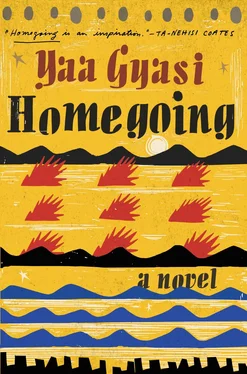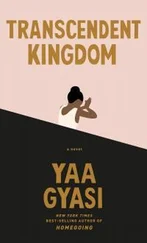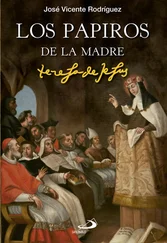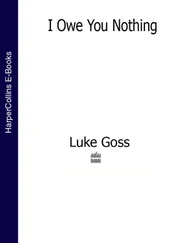Finally, most urgently, thank you to Matthew Nelson-Teutsch, best reader and dearest heart, who brought to each reading of this novel all of the generosity, intelligence, goodness, and love that he brings to my days. We, this novel and I, are better for it.
Yaa Gyasi was born in Ghana and raised in Huntsville, Alabama. She holds a BA in English from Stanford University and an MFA from the Iowa Writers’ Workshop, where she received a Dean’s Graduate Research Fellowship. She lives in Berkeley, California.
An Alfred A. Knopf Reading Group Guide Homegoing by Yaa Gyasi
The introduction, author biography, discussion questions, and suggested reading that follow are designed to enhance your group’s discussion of Homegoing, the stunning debut novel by Yaa Gyasi.
Discussion Questions
1. Evaluate the title of the book. Why do you think that the author chose the word Homegoing ? What is a homegoing and where does it appear in the novel? In addition to the term’s literal meaning, discuss what symbolic meanings or associations the title might have in terms of a connection with our place of birth, our ancestors, our heritage, and our personal and cultural histories.
2. Explore the theme of belief. What forms of belief are depicted in the book and what purpose do these beliefs seem to serve for the characters? Does the author reveal what has shaped the characters’ beliefs? Do these beliefs seem to have a mostly positive or negative impact on the believer and those around them?
3. What perspective does the book offer on the subject of beliefs and otherness? For instance, does the book delineate between superstition and belief? Why does Ma Aku reprimand Jo after he is kicked out of church? What do the Missionary and the fetish man contribute to a dialogue on beliefs and otherness? Does the book ultimately suggest the best way to confront beliefs that are foreign to us?
4. Evaluate the treatment and role of women in the novel. What role does marriage play within the cultures represented in the novel and how are the women treated as a result? Likewise, what significance does fertility and motherhood have for the women and how does it influence their treatment? In the chapter entitled “Effia,” what does Adwoa tell Effia that her coupling with James is really about? In its depiction of the collective experiences of the female characters, what does the book seem to reveal about womanhood? How different would you say the treatment and role of women is today? Discuss.
5. Analyze the structure of the book. Why do you think the author assigned a chapter to each of the major characters? What points of view are represented therein? Does any single point of view seem to stand out among the rest or do you believe that the author presented a balanced point of view? Explain. Although each chapter is distinct, what do the stories have in common when considered collectively? How might your interpretation of the book differ if the author had chosen to tell the story from a single point of view?
6. Consider the setting of the book. What time periods are represented and what places are adopted as settings? Why do you think that the author chose these particular settings? What subjects and themes are illuminated via these particular choices? How does the extensive scope of the book help to unify these themes and create a cohesive treatment of the subjects therein?
7. In the chapter entitled “Quey,” Fiifi tells Quey that “[the] village must conduct its business like [the] female bird” (this page). What does he mean by this and why do you think that Fiifi chooses this approach?
8. Why was Quey sent to England? After his return home, why does Quey say that it was safer in England? Why might he feel that what he faces at home is more difficult than the challenges he faced in leaving home and living abroad?
9. James’s mother, Nana Yaa, says that the Gold Coast is like a pot of groundnut soup (this page). What does she mean by this?
10. Why does Akosua Mensah insist to James, “I will be my own nation” (this page)? What role do patriotism, heritage, and tradition play in contributing to the injustices, prejudices, and violence depicted in the book? Which other characters seem to share Akosua’s point of view?
11. Explore the theme of complicity. What are some examples of complicity found in the novel? Who is complicit in the slave trade? Where do most of the slaves come from and who trades them? Who does Abena’s father say is ultimately responsible (this page)? Do you agree with him? Explain why or why not.
12. Examine the relationships between parents and children in the book. How would you characterize these relationships? Do the children seem to understand their parents and have good relationships with them and vice versa? Do the characters’ views of their parents change or evolve as they grow up? How do the characters’ relationships with their parents influence the way that they raise their own children?
13. What significance does naming have in the book? Why do some of the characters have to change or give up their names? Likewise, what do the characters’ nicknames reveal both about them and about those who give or repeat these names? What does this dialogue ultimately suggest about the power of language and naming?
14. Explore the motif of storytelling. Who are the storytellers in the book and what kinds of stories do they tell? Who is their audience? What might these examples suggest about the purpose and significance of a storytelling tradition?
15. According to Akua, where does evil begin? Where else in the book do readers find examples that support her view? What impact does Akua’s opinion have on Yaw’s lifework? Does he agree with Akua’s view or refute it? Do you agree with her? Discuss.
16. What is history according to Yaw? What does he tell his students is “the problem of history” (this page)? Who does Yaw say we believe when reading historical texts and what does he say is the question we must ask when studying history? How might these ideas influence your own reading of Gyasi’s book and reshape your ideas about the historical subjects and themes treated therein?
17. Sonny says that the problem in America “wasn’t segregation but the fact that you could not, in fact, segregate” (this page)? What does he mean by this? What does Sonny say that he is forced to feel because of segregation? Which of the other characters experience these same feelings and hardships? Does there seem to be any progress as the story goes on? If so, how is progress achieved? Alternatively, what stymies and slows progress in this area?
18. What is Marcus studying and why isn’t his research going well? What feeling does he indicate that he hopes to capture with his project? Why does Marcus go to Ghana and what does he learn from his experiences there? Marcus believes that “most people lived their lives on upper levels, not stopping to peer underneath (this page). What does he mean by this? Where do we find examples of this elsewhere in the book? Are there any characters in the novel who defy this characterization?
19. Consider the book’s treatment of colonialism and imperialism. In the chapter entitled “Esi” at the start of the book, what does Esi’s mother tell her daughter that weakness and strength really are? How does her definition of weakness and strength correspond to the dialogue about colonialism and imperialism that runs throughout the book? Discuss how this dialogue expands into a deeper conversation about freedom and human rights. Have the issues surrounding colonialism, imperialism, freedom, and human rights featured in the book been resolved today or do they linger? If they remain, does the book ultimately offer any suggestions or advice as to how this might be remedied?
Читать дальше

![Ally Carter - [Gallagher Girls 01] I'd Tell You I Love You But Then I'd Have to Kill You](/books/262179/ally-carter-gallagher-girls-01-i-d-tell-you-i-lo-thumb.webp)










